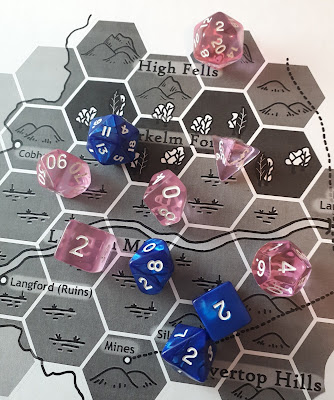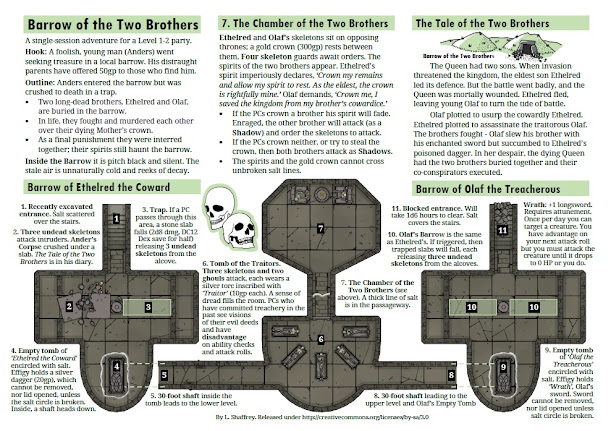Tweaking D&D 5e to run a Hexcrawl
As I mentioned in my last post on player's maps, I’m putting together a wilderness hexcrawl setting for D&D 5e called Langden Mire. I want to give the players a handout on the hexcrawl rules we’ll be using before we start play. I have my own rules sorted out for the hexcrawl (weather, travel, navigation, encounters, encumbrance, etc) which I'll post on here in a few months.
However, I was interested in what tweaks I should make to the default D&D 5e rules to smoothly run a hexcrawl. The general consensus from reading blogs seems to be that D&D 5e has specific rules that trivialise the challenges presented by overland exploration (for example, the Ranger’s Natural Explorer ability means Rangers cannot get lost in their chosen environment). However, looking through the books I can only find a few rules that might cause some problems for a hexcrawl, and it seems relatively straightforward to house rule these away.
The list of the tweaks I plan to make to default D&D 5e is below. Am I missing something else? Are there other rules in D&D 5e that need to be modified in order to smoothly run a hexcrawl?
1. Resting
This seems to be the biggest issue. In D&D 5e, hit points, hit dice, spell slots, and character abilities are recovered after a Long Rest. Wilderness exploration typically occurs over the period of days to weeks. If PCs take Long Rests every 24 hours (as per the default D&D 5e rules) then this will trivialise the challenges presented by wilderness. I plan to implement the following resting rule (which I originally saw in the Adventure in Middle Earth 5e system):
House Rule, Safe Haven Long Resting: Long Rests can only occur in DM specified locations (such as a village or town). Resting for the night in the wilderness only provides the benefits of a Short Rest. Not resting for the night while in the wilderness will incur one level of exhaustion.
Note that an alternative would be to introduce Gritty Realism resting (DMG p267), but I think the above house rule would keep things a bit more vanilla.
2. Spellcasting
Changing or removing the following spells seems advisable:
- Windwalk: The spell is not available.
- Phantom Steed: The spell is available but does not have the Ritual tag.
- Leomund’s Tiny Hut: The spell is available but does not have the Ritual tag.
I’ve read a lot of discussion about spells such as Goodberry etc. trivialising the challenges presented by the scarcity of food and water. From playing D&D 1e back in the day I always found that water and food challenges were easily solved by the PCs buying mules and extra supplies, so I don’t really see what the problem is with leaving these spells in place.
3. Ranger Abilities and Outlander Backgrounds
The default D&D 5e Ranger abilities and Outlander background allow PCs to circumvent some wilderness challenges. I plan to rebalance these abilities so that they apply to a wider set of environments, but are less effective.
Rangers, Favoured Terrain (PHB p91): Modify the first 2 aspects of the Natural Explorer ability:
- You gain Advantage on all Navigation Checks in all wilderness environments.
- If travelling alone, difficult terrain doesn’t slow your travel speed. This applies to all wilderness environments.
Outlander Background (PHB p136): Modify the Wanderer Feature:
- You gain Advantage on Foraging checks in all wilderness environments.
- You gain Advantage on Navigation Checks in wilderness areas you have already explored.
That’s it, although I might have to crack down on the players if they all decide to be flying races! Am I missing anything else? Perhaps you have views on the house rules above?
A brief write of the D&D 5e tweaks I'll be using can be found here.




An alternative for your Ranger changes is simply using the optional class features from TCoE: Deft Explorer (TCoE p56) seems a nice fix for your issues with Natural Explorer. I find the PHB Ranger pretty bad and wouldn't want to play without the TCoE changes anyway!
ReplyDelete